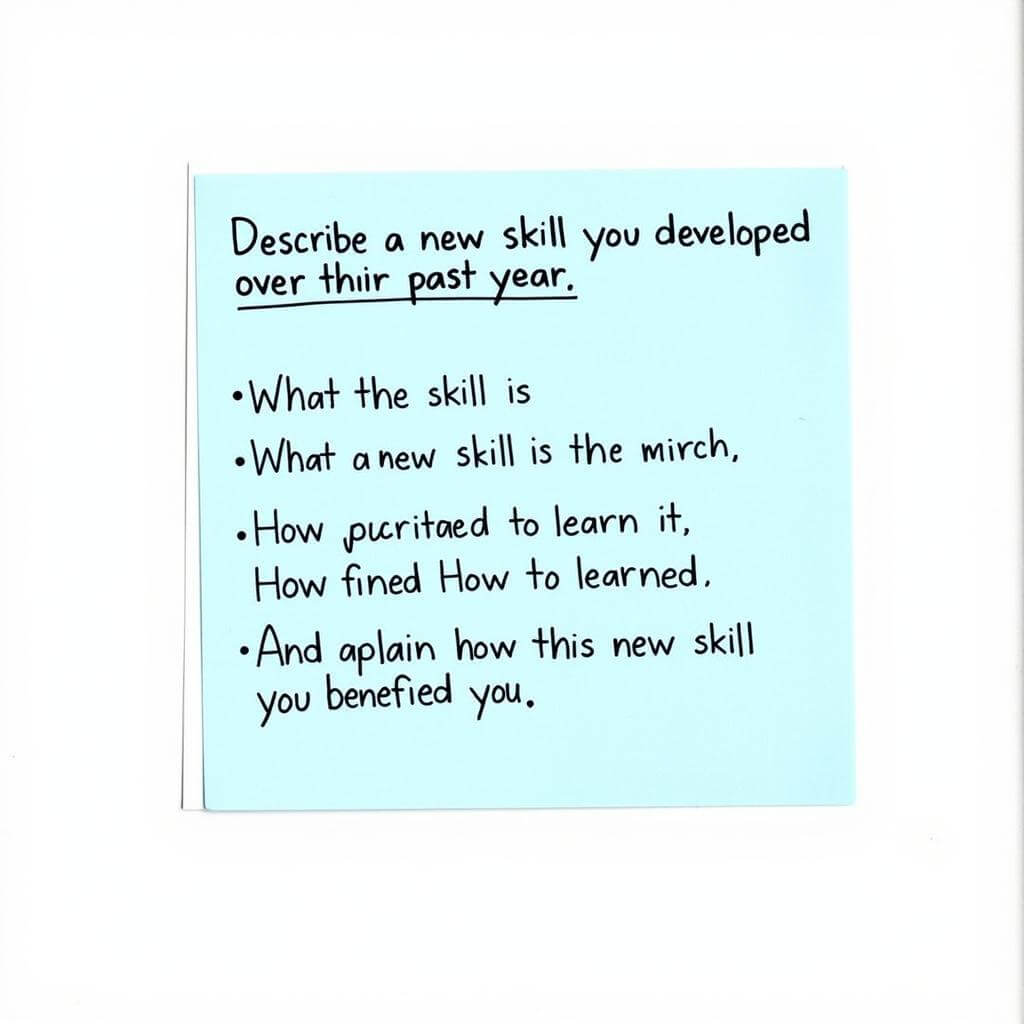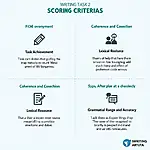The topic of describing a new skill you’ve developed recently is a common one in IELTS Speaking tests. It allows examiners to assess your ability to discuss personal experiences, express opinions, and use appropriate vocabulary related to learning and self-improvement. This topic has appeared frequently in past exams and is likely to continue being relevant in future tests.
Describe a subject you enjoyed learning in school can be a great way to practice talking about learning experiences and skills development. Similarly, discussing a new skill can help you showcase your ability to articulate personal growth and achievements.
Part 1: Introduction and Interview
In this section, the examiner may ask you some general questions about skills and learning. Here are a few examples:
- Do you enjoy learning new skills?
- What kind of skills do you think are important for your future career?
- How do you usually go about learning a new skill?
Let’s look at a sample answer for the first question:
Examiner: Do you enjoy learning new skills?
Candidate (Band 7-8 response): Absolutely! I find the process of acquiring new abilities to be incredibly rewarding. There’s something exhilarating about pushing my boundaries and discovering what I’m capable of. Whether it’s picking up a new language or trying my hand at a new sport, I always feel a sense of accomplishment when I make progress. It’s not always easy, of course, but overcoming challenges is part of what makes it so satisfying in the end.
Part 2: Long Turn
Here’s a sample cue card related to the topic:
Describe a new skill you developed over the past year
You should say:
- What the skill is
- Why you decided to learn it
- How you learned it
- And explain how this new skill has benefited you
 IELTS Speaking Part 2 cue card about describing a new skill
IELTS Speaking Part 2 cue card about describing a new skill
Sample answer (Band 8-9):
Over the past year, I’ve developed a new skill that I’m quite proud of – digital illustration. I decided to learn this skill because I’ve always been passionate about art, but I wanted to expand my horizons beyond traditional mediums and embrace the digital age**.
To learn digital illustration, I took a multi-faceted approach. First, I enrolled in an online course on a popular e-learning platform, which provided me with a solid foundation in the basics of digital art software and techniques. Alongside this, I devoured countless YouTube tutorials, which offered specific tips and tricks from experienced artists. I also joined online communities** of digital artists, where I could share my work, receive feedback, and learn from peers.
The learning process was both challenging and rewarding. Initially, I struggled with the transition from physical to digital tools, but with persistent practice, I gradually became more comfortable. I made it a point to dedicate at least an hour each day** to honing my skills, experimenting with different styles and techniques.
This new skill has benefited me in numerous ways. Professionally, it has opened up new opportunities in freelance work and has enhanced my marketability in the design industry. On a personal level, it has boosted my creativity and given me a new medium for self-expression. Moreover, the process of learning this skill has improved my patience and perseverance**, qualities that are valuable in all aspects of life.
In conclusion, developing this new skill has been an enriching experience that has not only expanded my artistic abilities but also contributed to my personal growth.
Follow-up questions:
- How long did it take you to become proficient in this skill?
- Did you face any significant challenges while learning?
Sample answers:
-
(Band 7-8) It took me approximately six months to reach a level where I felt reasonably proficient. However, I believe that mastering any skill is an ongoing process, and I’m still learning and improving every day. The initial learning curve was quite steep, but after the first couple of months, I noticed a significant improvement in my work.
-
(Band 8-9) Yes, I encountered several challenges during the learning process. The most significant was overcoming the technical hurdles associated with digital art software. There was a plethora of tools and features to learn, which felt overwhelming at times. Additionally, developing my own style in this new medium was challenging. I had to strike a balance between emulating the techniques I admired in other artists and finding my unique voice. Overcoming these challenges required persistence and a growth mindset, but they ultimately made the learning experience more rewarding.
Part 3: Two-way Discussion
In this section, the examiner will ask more abstract questions related to the topic of skills and learning. Here are some potential questions and sample answers:
Examiner: How do you think the process of learning new skills has changed with the advent of technology?
Candidate (Band 8-9): Technology has revolutionized the way we acquire new skills in several significant ways. Firstly, it has democratized access to knowledge. With online courses, tutorials, and educational videos readily available, often for free, anyone with an internet connection can learn almost anything, anywhere, at any time. This has broken down traditional barriers to education and skill acquisition.
Secondly, technology has made learning more interactive and engaging. Virtual reality simulations, for instance, allow people to practice skills in a safe, controlled environment before applying them in real-world situations. This is particularly valuable for fields like medicine or aviation.
Moreover, technology has facilitated global collaboration in learning. Online forums and communities enable learners to connect with experts and peers worldwide, fostering a rich exchange of ideas and experiences.
However, this technological shift also presents challenges. The abundance of information can be overwhelming, and learners need to develop strong critical thinking skills to discern quality sources. Additionally, the ease of access to information might lead some to undervalue the effort required to truly master a skill.
In conclusion, while technology has undoubtedly made skill acquisition more accessible and diverse, it also requires us to adapt our learning strategies and develop new meta-skills, such as digital literacy and self-directed learning.
Describe an interesting trend you have noticed recently could be a great way to further explore how technology is changing various aspects of our lives, including how we learn new skills.
Examiner: Do you think there are any skills that cannot be learned online?
Candidate (Band 7-8): While online learning has certainly expanded the scope of what can be taught remotely, I believe there are still some skills that are challenging, if not impossible, to fully master without in-person instruction or practice.
For instance, many hands-on, practical skills in fields like surgery, dentistry, or certain trades like plumbing or carpentry require physical presence and real-time feedback. While theory can be learned online, the tactile experience and immediate guidance are crucial for developing proper technique and safety practices.
Similarly, interpersonal skills like public speaking, negotiation, or counseling, while they can be improved through online courses, benefit greatly from face-to-face interaction. The nuances of body language, tone, and real-time dynamics are difficult to replicate in a virtual environment.
Additionally, skills that rely heavily on sensory experiences, such as wine tasting or perfume making, are limited in what can be conveyed online. The full spectrum of tastes, smells, and textures is essential for developing expertise in these areas.
That being said, technology is constantly evolving, and virtual reality and other immersive technologies may eventually bridge some of these gaps. However, for now, I believe a blended approach of online and in-person learning is often the most effective for many complex skills.
Key Vocabulary and Phrases
Here are some advanced vocabulary items and phrases that can help you achieve a higher band score in your IELTS Speaking test:
-
To expand one’s horizons (phrase) – /ɪkˈspænd wʌnz həˈraɪzənz/ – to broaden one’s knowledge, experience, or range of activities
Example: “Traveling is a great way to expand your horizons and learn about different cultures.” -
Multi-faceted approach (adjective + noun) – /ˌmʌltiˈfæsɪtɪd əˈprəʊtʃ/ – involving or including many different aspects or features
Example: “Learning a new language often requires a multi-faceted approach, including listening, speaking, reading, and writing practice.” -
To embrace (verb) – /ɪmˈbreɪs/ – to accept or support willingly and enthusiastically
Example: “Many companies are embracing remote work as a long-term solution.” -
Persistent (adjective) – /pəˈsɪstənt/ – continuing firmly or obstinately in an opinion or course of action despite difficulty or opposition
Example: “Her persistent efforts finally paid off when she mastered the difficult technique.” -
To enhance (verb) – /ɪnˈhɑːns/ – to increase or improve in value, quality, desirability, or attractiveness
Example: “Regular practice can significantly enhance your musical skills.”
Describe a person who has influenced your lifestyle choices can be an excellent opportunity to use some of these vocabulary items in context, especially when discussing how someone has inspired you to develop new skills or habits.
Examiner’s Advice
To achieve a high score in the IELTS Speaking test, particularly when describing a new skill:
-
Prepare a range of personal experiences related to learning and skill development. This will help you respond confidently to various questions.
-
Use a variety of advanced vocabulary and idiomatic expressions naturally throughout your responses.
-
Structure your answers clearly, especially in Part 2. Use discourse markers to organize your thoughts and make your speech more coherent.
-
Provide specific examples to support your points. This demonstrates your ability to elaborate on ideas.
-
Practice speaking at length about abstract concepts related to skills and learning for Part 3 questions.
-
Work on your pronunciation and fluency by regularly practicing speaking English, perhaps by describing your daily activities or recent experiences in learning new things.
-
Develop your critical thinking skills to provide thoughtful and nuanced responses, especially for Part 3 questions.
Remember, the key to success in the IELTS Speaking test is not just about the content of your answers, but also how you deliver them. Confidence, fluency, and the ability to express complex ideas clearly are all crucial factors.
Describe a place you visited that was very different from your expectations can be an excellent topic to practice these skills, as it requires you to describe experiences, compare and contrast, and express personal opinions – all valuable abilities for discussing new skills you’ve developed.
By following these guidelines and consistently practicing, you can improve your performance in the IELTS Speaking test and increase your chances of achieving a high band score when describing a new skill you’ve developed or discussing any other topic.


